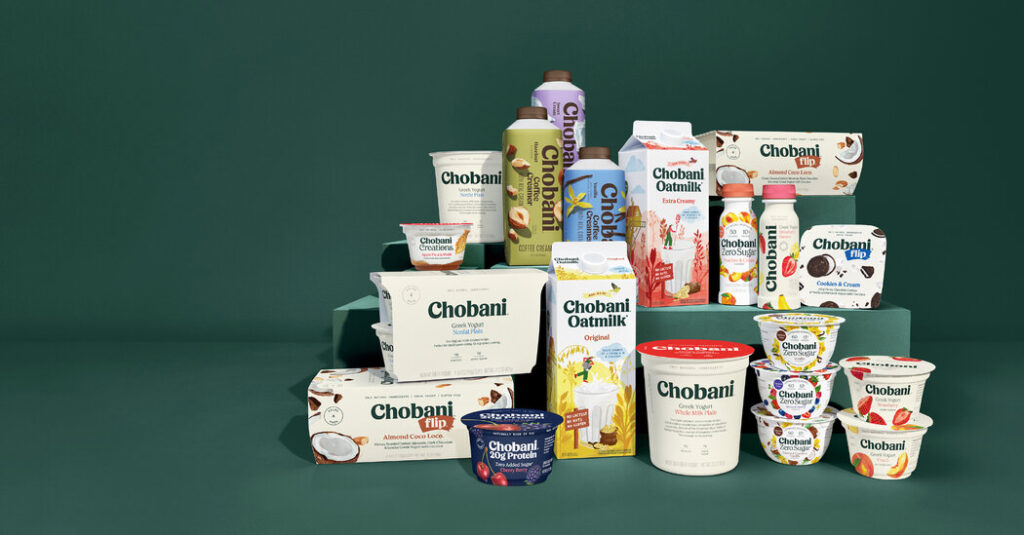Chobani got its start in 2005 in the middle of New York State, in a decades-old Kraft factory that had become defunct, initially hiring just a few of its workers to produce Greek-style yogurt.
Two decades later, the company — now one of the nation’s biggest producers of dairy products — is opening another plant nearby, to significantly more fanfare and economic impact.
Chobani and New York State plan to announce on Tuesday that the company will open a million-square-foot factory in Rome, N.Y., costing at least $1.2 billion, that will be able to make one billion pounds of dairy products a year. Company executives describe the plant, which they reckon will be the biggest dairy factory in the United States, as a much-needed expansion to fulfill growing demand.
“We’ve been growing, but that has accelerated dramatically over the last few years, eating up a lot of our capacity,” Hamdi Ulukaya, Chobani’s founder and chief executive, said in an interview. “These are the preparations for growth that’s coming and that we’re experiencing.”
The new manufacturing center, which is expected to nearly double Chobani’s work force in New York State, is the latest sign of the company’s ambitions. Chobani already claims to be one of the fastest-growing food companies in the United States, with net sales last year rising 17 percent, to $2.96 billion, and adjusted pretax earnings rising 26 percent, to $509 million.
Chobani has said that it now controls about a fifth of the American yogurt market, citing Nielsen data. It has also branched out well beyond Greek-style yogurt, the product category it helped pioneer. The company now makes creamers, oat milk, and — since its $900 million acquisition of La Colombe in 2023 — coffee beverages. (Mr. Ulukaya last year also personally bought Anchor Brewing, a centenarian San Francisco brewer, after it went out of business.)
Just one month ago, Chobani announced that it would invest $500 million to expand a factory in Idaho that is expected to bolster production by 50 percent. New York officials, eager to cement the state’s standing as a giant in the agribusiness sector, said that they were keen to win the competition for the company’s biggest-ever plant.
That included offering millions of dollars in tax credits and grants to help support a shovel-ready site in Rome. The expense was worth Chobani’s agreement to invest more than $1 billion and add more than 1,000 jobs in the Mohawk Valley region — roughly a third of the company’s existing global work force — according to Gov. Kathy Hochul of New York.
“We were in high pursuit,” she said in an interview, adding that her team faced competition from other states.
Chobani’s growth comes at a challenging time for companies across the business spectrum. President Trump’s trade threats have upended supply chains, and that has made it more difficult for Chobani to obtain the European manufacturing equipment that the company says it cannot get anywhere else.
And yearslong fears about inflation have weighed on consumer-facing businesses. “When it comes to pricing, we’re very, very sensitive,” Mr. Ulukaya said, though Chobani noted that it had kept costs in check via manufacturing improvements and better economies of scale.
Mr. Ulukaya added that Chobani would hold onto the socially conscious business practices that have set it apart from many other companies. They include generous benefits for employees; worker housing; and, perhaps most prominently, a yearslong commitment to hiring refugees.
Nine years ago, Mr. Ulukaya’s efforts to employ fellow immigrants — starting with newly arrived refugees from a resettlement center in Utica, N.Y. — drew threats on social media and conspiratorial articles on hard-right websites. Despite a second Trump administration that has made immigration crackdowns a priority, the Chobani chief said that his commitment to the cause remained steadfast, and he noted his continued work with the Tent Partnership for Refugees, a nonprofit that he founded.
“We cannot operate any other way,” he said. “To me, anybody is welcome.”
What comes next for Chobani, according to Mr. Ulukaya, may include finally going public. The company filed for an initial public offering in 2021, most likely at a multibillion-dollar valuation, but officially postponed the move the next year amid challenging market conditions.
Mr. Ulukaya pointed to the company’s financials as signs of solid health, and he said that employees with stock holdings would benefit from Chobani’s being publicly traded. But for now, he said, the focus is on the more than $1 billion that the company is investing in New York State and Idaho.
“An I.P.O. is a possibility,” he said. “But I haven’t made up my mind.”
https://www.nytimes.com/2025/04/22/business/dealbook/chobani-dairy-factory-ny.html


